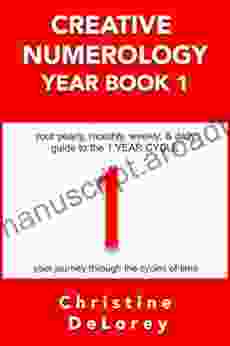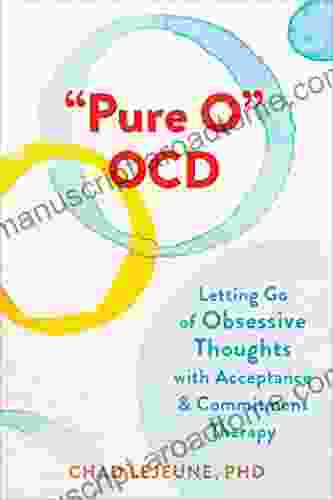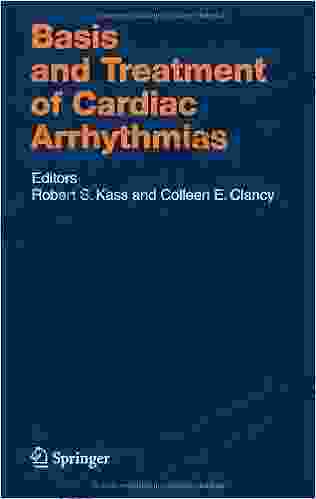Letting Go Of Obsessive Thoughts: A Journey to Freedom with Acceptance and Commitment Therapy

5 out of 5
| Language | : | English |
| Text-to-Speech | : | Enabled |
Are you trapped in a cycle of obsessive thoughts that consume your mind and interfere with your daily life? You're not alone. Millions of people struggle with intrusive, distressing thoughts that can make it difficult to focus, relax, or enjoy life. But there is hope. Acceptance and Commitment Therapy (ACT),a powerful evidence-based approach, can help you break free from the grip of obsessive thoughts and reclaim your mental well-being.
Understanding Obsessive Thoughts
Obsessive thoughts are unwanted, intrusive thoughts that repeatedly enter your mind, causing distress and anxiety. They can be related to any topic: fear of contamination, harm to yourself or others, sexual thoughts, or religious doubts. These thoughts are often accompanied by compulsive behaviors, such as excessive hand washing, checking, or seeking reassurance.
How ACT Can Help
ACT is a type of cognitive behavioral therapy that focuses on accepting your thoughts and feelings rather than fighting them. It teaches you to observe your thoughts with detachment, without judgment or attachment. By ng so, you can reduce their power over you.
ACT also emphasizes the importance of living a values-based life. Instead of trying to control your thoughts, you learn to focus on living according to your values, even when faced with discomfort. This can help you create a more meaningful and fulfilling life, regardless of the presence of obsessive thoughts.
Practical Strategies and Exercises
- Mindfulness: Learn to observe your thoughts and feelings with acceptance and curiosity, without judgment or attachment.
- Thought Defusion: Develop strategies to distance yourself from your thoughts, seeing them as just words or images rather than absolute truths.
- Values Clarification: Identify your core values and learn to live in accordance with them, even when faced with challenges.
- Behavioral Activation: Engage in activities that bring you joy and meaning, despite the presence of obsessive thoughts.
- Acceptance and Commitment: Practice accepting your thoughts and feelings as part of your experience, rather than trying to control or eliminate them.
Benefits of ACT
Research has consistently shown that ACT is effective in reducing the frequency and intensity of obsessive thoughts. It can also lead to improvements in:
- Anxiety and depression
- Quality of life
- Sleep quality
- Relationships
- Overall well-being
Taking the First Step
If you're ready to break free from the cycle of obsessive thoughts, consider seeking professional help from a therapist trained in ACT. They can guide you through the process, provide personalized support, and help you develop effective coping mechanisms.
Additional Resources
- Association for Contextual Behavioral Science (ACBS): https://contextualscience.org/
- International Obsessive-Compulsive DisFree Download Foundation (IOCDF): https://iocdf.org/
- Anxiety and Depression Association of America (ADAA): https://adaa.org/
Letting go of obsessive thoughts is a journey, not a destination. It requires patience, practice, and a willingness to embrace your experiences, both good and bad. With the help of ACT, you can break free from the cycle of intrusive thoughts, live a values-based life, and create a more fulfilling future for yourself. Remember, you are not alone, and there is hope for recovery.
5 out of 5
| Language | : | English |
| Text-to-Speech | : | Enabled |
Do you want to contribute by writing guest posts on this blog?
Please contact us and send us a resume of previous articles that you have written.
 Book
Book Novel
Novel Page
Page Chapter
Chapter Text
Text Story
Story Genre
Genre Reader
Reader Library
Library Paperback
Paperback E-book
E-book Magazine
Magazine Newspaper
Newspaper Paragraph
Paragraph Sentence
Sentence Bookmark
Bookmark Shelf
Shelf Glossary
Glossary Bibliography
Bibliography Foreword
Foreword Preface
Preface Synopsis
Synopsis Annotation
Annotation Footnote
Footnote Manuscript
Manuscript Scroll
Scroll Codex
Codex Tome
Tome Bestseller
Bestseller Classics
Classics Library card
Library card Narrative
Narrative Biography
Biography Autobiography
Autobiography Memoir
Memoir Reference
Reference Encyclopedia
Encyclopedia Charles Marsh
Charles Marsh Chris Robertson
Chris Robertson Susan Simpson
Susan Simpson Christina Cameli
Christina Cameli J T Harding
J T Harding Terese Svoboda
Terese Svoboda Catherine M Evans
Catherine M Evans Mencius
Mencius David Sherman
David Sherman Heidi Keller
Heidi Keller Chittaranjan Dhurat
Chittaranjan Dhurat Daniel Palmer
Daniel Palmer Judith Viorst
Judith Viorst Charles Henderson
Charles Henderson Christopher King
Christopher King Henry Carroll
Henry Carroll Ceri Thompson
Ceri Thompson Charles A Rohde
Charles A Rohde Christian Crumlish
Christian Crumlish Darrel Kelly
Darrel Kelly
Light bulbAdvertise smarter! Our strategic ad space ensures maximum exposure. Reserve your spot today!
 Brandon CoxFollow ·19.6k
Brandon CoxFollow ·19.6k Ivan CoxFollow ·16.8k
Ivan CoxFollow ·16.8k Vladimir NabokovFollow ·7.3k
Vladimir NabokovFollow ·7.3k Andy HayesFollow ·8.7k
Andy HayesFollow ·8.7k Ralph Waldo EmersonFollow ·9.6k
Ralph Waldo EmersonFollow ·9.6k Kazuo IshiguroFollow ·4.3k
Kazuo IshiguroFollow ·4.3k Terence NelsonFollow ·13.5k
Terence NelsonFollow ·13.5k W.B. YeatsFollow ·14.1k
W.B. YeatsFollow ·14.1k

 Esteban Cox
Esteban CoxYour Yearly Monthly Weekly Daily Guide To The Year Cycle:...
As we navigate the ever-changing currents...

 George Orwell
George OrwellIdentifying and Understanding Astronomical and...
Prepare to embark on an extraordinary...

 Arthur Conan Doyle
Arthur Conan DoyleYour Yearly Monthly Weekly Daily Guide to the Year Cycle:...
Welcome to "Your Yearly Monthly Weekly Daily...

 Steve Carter
Steve CarterUrban Informatics: Unlocking the Secrets of Smart Cities...
An In-Depth Exploration of Urban...

 Henry Hayes
Henry HayesUnveil the Secrets of the Order of the Solar Temple: A...
In the realm of secret...
5 out of 5
| Language | : | English |
| Text-to-Speech | : | Enabled |














